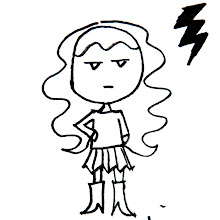Bakit masarap ang bawal? (Why is the forbidden pleasurable?)
That was one of the questions I encountered earlier today in Philo 1.
Forbidden things seem to hold a special power over us. When we are barred from going to certain places, doing certain activities, seeing certain people, or are generally withheld from exposing ourselves to a certain something, our curiosities are more aroused than anything else. These forbidden tend to occupy our minds and haunt us until we finally cross the line.
The story of Romeo and Juliet is one of the most famous romances of our time, probably thanks to the doomed, forbidden love the plot revolves around on. It isn't surprising how today, so many people consciously (and preferrably even?) go for those hidden/illegal relationships. If these couples know it's going to be harder (parents don't want, etc.) and nearly impossible unless they elope (haha) why push so hard? Why work so hard at keeping something alive, going against the odds, and fighting the multitude of problems hurled by the situation? Or another example: Back in high school, there were always restrictions on uniforms, clothing, hair, and appearance. But despite these clearly explained rules, students still lengthened their skirts, wore "inappropriate clothing" during school fairs, painted their nails bright colors, dyed their hair blonde, and cut their hair boyishly short. And there was no feeling of shame or guilt in doing so. On the other hand, these rebels even flaunted their defiance.
Someone in class shared that maybe these people keep at it because of the thrill. The adrenaline. After all, isn't there something so wicked and exciting about being a rebel? (Like the way some girls want "bad boys"?) Someone else shared that another reason why people enjoy the forbidden is because it's an action that speaks defiance. When we openly do that very thing we're not supposed to do, it's challenging the authority. It's looking that teacher/parent in the eye with a smug, haughty, expression. (Then getting grounded afterwards. Haha!) Perhaps the lure lies in the opportunity of breaking or going over the power of that authority, even for just a little while. Rebelling makes us feel powerful. Maybe disobeying the rules makes us feel like we stand out. It gives us pride that we're not like "the rest of those cattle-like followers." It brands us as a league of our own.
Another way of phrasing the question would be...
"What's so tempting about temptation?" It sounds silly, but it still makes sense.
Temptation, which probably has Biblical origins, would imply the existence of "sin" (which in the Biblical context are things we should not do because they separate us from God). What's so alluring about sin (although there are people out there who aren't allured to certain sinful acts?). Why do we have such things as sinful or guilty pleasures?
Other questions to ponder:
Why does rebellion have a special thrill? Is it built into everyone, or only the naughtier, "badder" ones of the population?
What is it with us and authority? Do we want to be the authority? Why do we want to be the most powerful? Is that natural for everyone?
Open Science Songs: Sign This Publishing Plan
7 years ago





No comments:
Post a Comment